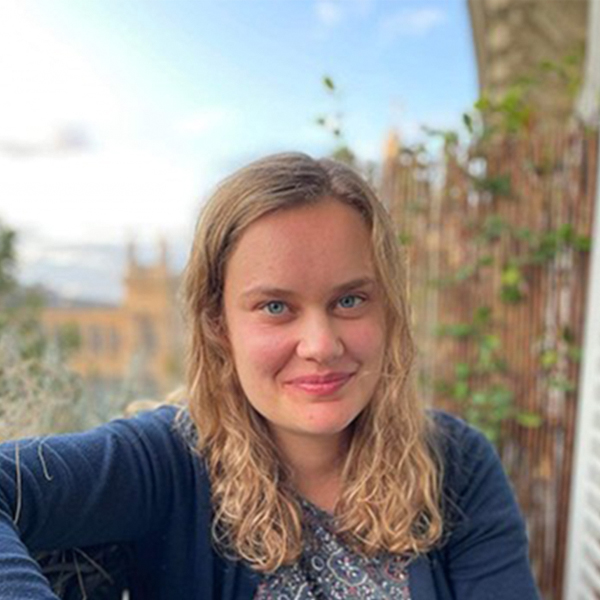UK scientist learns about berry important ways to manage plant pests

Did you know that some of Canada's major field crops are wheat, canola, barley…and blueberries?
It's true: Canada is the world's largest blueberry producer. And that's why Suzie Pearce, a government scientist from the United Kingdom (UK), thought the Canadian Food Inspection Agency (CFIA) was the best place to learn about plant health.
Between 2018 and 2020, blueberry production in Great Britain increased by 61%. Invasive species can have devastating impacts on berry crops, so Pearce will gather intelligence with help from the CFIA. This work will support the UK's efforts to stop unwanted blueberry pests from moving into that country.
Pearce will arrive in Canada for the first time in April 2022 and work here for six months, all thanks to her winning the European and Mediterranean Plant Protection Organization's (EPPO) Jens Georg Unger Plant Health Fellowship Award.
The winning moment and how the fellowship works
Pearce applied for the EPPO fellowship in August 2021, after obtaining her Master's degree in plant genetics and crop improvement and while working as a plant health policy advisor for the UK Department for Environment, Food and Rural Affairs.
When she learned that she was chosen for the fellowship out of 12 proposals received by EPPO, she was over the moon. "I was completely elated and I told the next 20 people that I saw."
The fellowship is open to plant professionals working in plant health in the early or middle stage of their careers.
Opportunities to work together also advance long-term international cooperation for the protection of plant health, and applicants can choose the organization they'd like to work with. In Pearce's case, the CFIA was her choice.
"It's up to the fellowship applicants to find and contact a partner institute or organization, and we are very pleased that the CFIA is willing to play an important role being the first partner organization for this fellowship," says Nico Horn, Director General of EPPO. "Maybe more fellowships at the CFIA will follow," says Horn.
Digital tools help governments respond to emerging threats
On the CFIA side, experts working with Pearce will learn about the UK's pest risk analysis process, where the Department for Environment, Food and Rural Affairs scans scientific publications, reports and developments from across the world.
This process helps to ensure that pest management actions and new regulations are more targeted. If risk levels are considered high or are unclear, a more detailed analysis is done.
The UK also assesses the level of risk that a particular pest poses to its environment compared to other invasive species. The information is then published in the UK Plant Health Risk Register, a digital screening tool aimed at finding new pests and diseases. It's the most complete tool of its kind in the world.
The CFIA does similar risk intelligence work to identify new pests before they get to Canada (such as the spotted lanternfly), and this collaboration will be a great opportunity for CFIA plant health experts to learn more about the tools used in the UK.
What's the game plan?
While in Canada, Pearce will work with the CFIA in many areas of plant health.
"I will be working in the Plant Health Risk Assessment Unit in Ottawa, performing a literature review on the pests associated with blueberry plants," says Pearce.
She will identify pests that pose a higher risk of damage to blueberry crops, like the blueberry maggot, and if there is enough time, she will carry out risk analyses on all of these pests. She also hopes to visit a CFIA laboratory and inspection office for hands-on experience, and to participate in various working groups.
Once Pearce returns home, she will share her findings with colleagues—and more importantly, take home lasting working relationships and plant safety networks the UK can tap into for years to come.
More fellowships to be awarded
And this is just the beginning. If all goes as planned, these fellowships to support global plant health will continue well into the future.
"From the 2020 International Year of Plant Health onwards, there has been a yearly call for proposals and at least one fellowship will be awarded every year," says Horn.
Asked if she would recommend that young scientists apply for fellowship programs like these, Pearce did not hesitate. "100%. It allows you to learn from another plant protection organisation, network with other scientists, and not to mention gives you an opportunity to live in another country for 6 months "
Learn more
- EPPO Jens-Georg Unger Plant Health Fellowship for international co-operation in plant health (2020-2030)
- Plant health
- Invasive species
- Don't bring uninvited "guests" with you this winter
- BioSAFE project uses genetic blueprints to study forest enemies
- Technology in the wild
Get more Inspect and Protect
- Want to learn more about what we do? Explore articles, videos and podcasts.
- Interested in reporting on a story? Contact CFIA Media Relations to arrange an interview with one of our experts.
- Have an idea or feedback to share? Get in touch!
- Date modified: